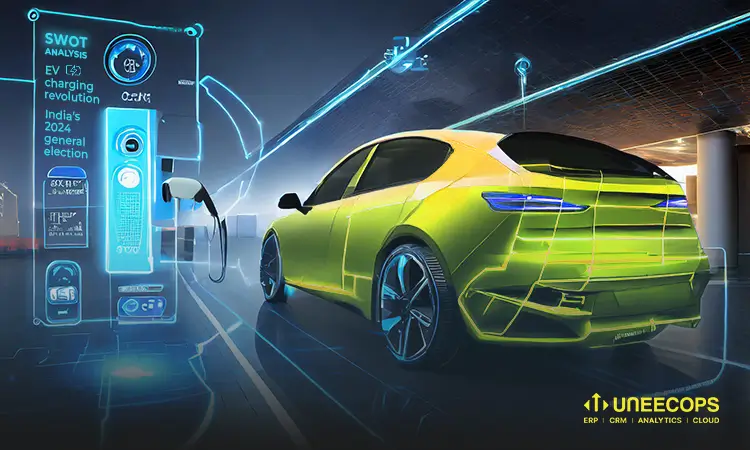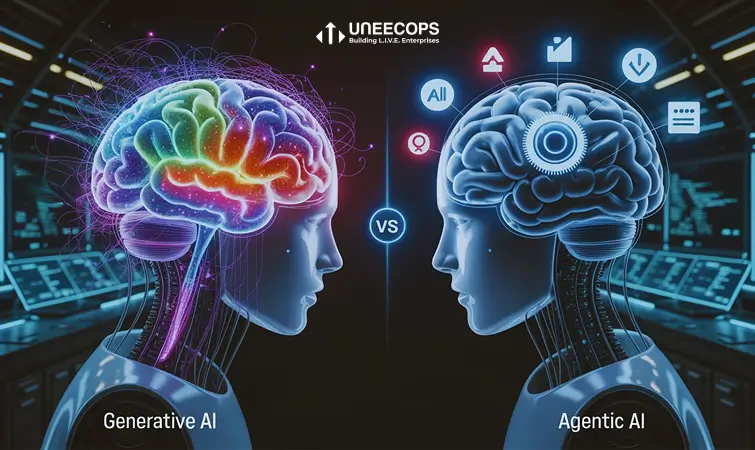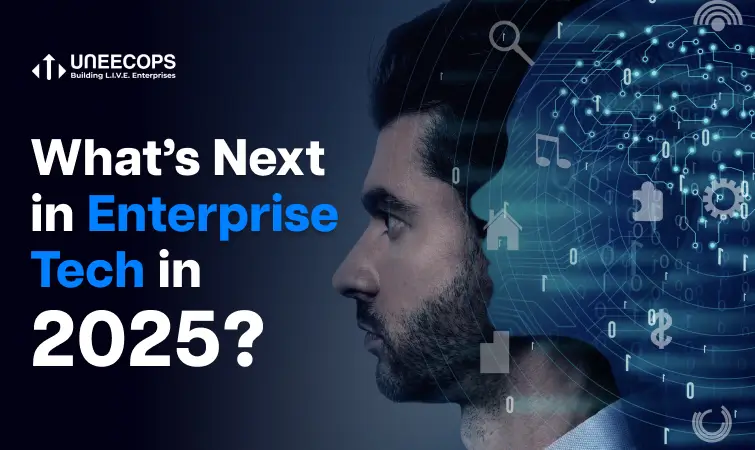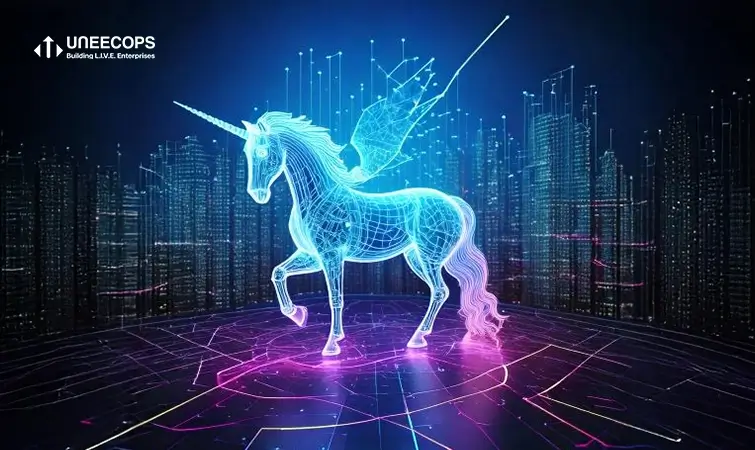Rev up your engines and fasten your seatbelts because we’re about to begin a thrilling journey through the electrifying world of automotive innovation in 2024.
The auto sector is going through a major shift with the introduction of Electric Vehicles/EVs. With projections indicating that 30% of new vehicles are expected to be electric by 2030, the landscape is ripe with opportunities and challenges. In this blog, we’ll do a quick SWOT analysis shaping the automotive industry’s electrifying momentum in 2024.
Strengths:
One of the key strengths of the auto industry lies in its innovation and adaptation capabilities. Companies that have embraced electric vehicle technology early on are poised to capitalize on the growing demand for eco-friendly transportation options. Also, advancements in infrastructure development and battery technology are enhancing the feasibility and attractiveness of EVs to consumers.
What is also pertinent is while global trends may indicate a slowdown in EV sales, India’s unique market dynamics offer a different perspective on the evolving landscape of electric mobility.
For the logistics industry, the EV shift signifies a fundamental change towards sustainable transportation options. Logistics firms must ready themselves for this transformation by investing in electric delivery fleets, charging infrastructure, and route optimization tailored to the specific requirements of electric vehicles (EVs). A prime example is Amazon India, which has forged partnerships with Eicher Motors and Buses to accelerate the electrification of its e-commerce logistics operations in the nation. Their aim is to deploy up to 1,000 electric trucks within the next five years for delivery services.
Weaknesses:
Despite the promising prospects, the transition to electric vehicles presents challenges for traditional automakers. Legacy manufacturing processes, supply chain constraints, and the need for retraining personnel pose significant hurdles. Moreover, concerns regarding range anxiety and the availability of charging stations continue to deter some consumers from fully embracing EVs.
Also, in India, factors such as reduced incentives, infrastructure limitations, and the saturation of early adopters have contributed to a more tempered growth trajectory for EVs.
Opportunities:
The shift towards electric vehicles opens a myriad of opportunities for automotive companies. Beyond reducing greenhouse gas emissions, EVs present opportunities for new revenue streams through services such as vehicle-to-grid integration and software-based features. Furthermore, partnerships with technology companies and government incentives can accelerate the adoption of EVs and drive market growth.
According to Gartner, Electric Vehicle (EV) models are projected to dominate over 50% of car maker models by 2030. This shift is primarily driven by governments’ efforts to reduce particulate matter emissions from vehicles. Automakers are reevaluating their strategies, with some aiming to eliminate tailpipe emissions from new light-duty vehicles by 2035. Moreover, the increasing significance of EVs in the market has attracted new players who are launching EV platforms, further accelerating the industry’s transition towards electrification.
Furthermore, major players in the Indian automotive sector, such as Tata Motors, Mahindra & Mahindra, and Hero Electric, are reevaluating their strategies to navigate through this period of adjustment. Some are focusing on price adjustments and delaying new model launches to better align with market dynamics and consumer demand.
Surging online sales and redefined luxury: The automotive retail landscape is undergoing a paradigm shift, with online car sales projected to surge globally. This trend, driven by convenience and transparency, is gaining momentum in India, with platforms like Droom disrupting the traditional market. Additionally, luxury automotive trends are evolving, with SUVs emerging as the ultimate luxury vehicle choice for the affluent segment. EVs are increasingly penetrating the luxury segment, reflecting the broader shift towards sustainable and environmentally conscious transportation solutions.
The EV charging revolution and growth in the used car market: Expectations for 2024 include a significant increase in charging stations globally, with governments and OEMs investing in infrastructure to support the EV ecosystem. In India, the used car market is experiencing significant growth, fueled by a shift towards a more organized market and the rise of online platforms like Droom. These developments underscore the growing momentum towards sustainable mobility solutions and the increasing acceptance of EVs in the Indian market.
Approaching India’s 2024 general election: Political shifts wield significant influence over regulations, infrastructure investments, and trade policies, shaping the trajectory of automotive and logistics industries. Stakeholders must closely monitor the political landscape, as it dictates economic policies and trade agreements, thus molding the automotive and logistics realms.
In this dynamic year, India’s automotive and logistics sectors confront a blend of challenges and opportunities. The pivot towards electric vehicles (EVs) aligns with India’s environmental objectives, signaling a greener future. Evolving partnerships underscore the importance of self-reliance and local innovation. Against the backdrop of impending elections, political dynamics will be pivotal in guiding both industries.
Threats:
While the transition to electric vehicles presents opportunities, it also brings forth several threats to traditional automakers. Increased competition from tech companies entering the automotive space, as well as regulatory changes and geopolitical tensions, could disrupt established supply chains and business models. Additionally, concerns regarding data security and privacy in connected vehicles pose significant challenges for industry stakeholders.
The surge in EV adoption not only echoes India’s dedication to environmental stewardship but also aligns with its ambitious goal of having 30 percent of all vehicles powered by electricity by 2030. However, the critical issue of charging infrastructure presents a significant challenge. While the momentum clearly favors EVs, the country urgently requires a robust network of charging stations to bolster this transformative movement. Overcoming this hurdle isn’t just imperative for the scalability of EVs but also represents a crucial stride towards realizing India’s lofty electric mobility objectives.
As India embarks on this transformative journey, businesses must exhibit agility, innovation, and adaptability. Those who anticipate and embrace these shifts will not only flourish in the evolving landscape but also contribute to the sustainable and efficient future of India’s automotive, transportation, and logistics sectors.
The Role of Technology Automation in Empowering EV Car Companies in 2024:
In navigating the opportunities and challenges presented by the electrification of the automotive industry in 2024, technology automation emerges as a crucial enabler for success. It shows auto enterprises the ‘roadmap’ to navigating threats and capture opportunities in this crucial year of elections and electrification. As investment decisions chart the growth trajectory of automotive sector, ‘automation’ and ‘digitalization’ can be a differentiating factor. Uneecops offers a suite of tech-driven automotive solutions designed to steer automobile businesses towards success in this new era of mobility.
ERP Solutions:
With Uneecops’ ERP solutions like SAP S/4 HANA Cloud or SAP Business One, automotive companies can achieve greater efficiency and visibility across their operations. From multi-location inventory management to streamlining product development processes, ERP automation streamlines workflows and enhances productivity.
Analytics Solutions:
Uneecops’ analytics solutions empower automotive companies with data-driven insights to make informed decisions. From conducting what-if analysis for engineering decisions to optimizing manufacturing efficiency and sustainability, analytics automation drives continuous improvement and innovation.
Customer Experience (CX) Solutions:
In delivering exceptional customer experiences, Uneecops’ CRM solutions play a pivotal role. By enabling real-time interactions with customers, tracking behaviors, and creating tailored experiences, CRM automation fosters customer loyalty and satisfaction throughout the entire auto ownership journey.
Cloud Solutions:
Uneecops’ cloud solutions accelerate the digital transformation of automotive businesses by providing secure, scalable, and agile infrastructure. From facilitating collaboration across the automotive ecosystem to enabling real-time management of manufacturing and logistics processes, cloud automation unlocks new levels of efficiency and competitiveness.
Racing towards tech-first automation to steer automotive companies ahead in 2024
As the automotive industry accelerates towards automatic-driven electrification in 2024, technology automation emerges as a critical driver of success. Uneecops’ tech-driven automotive solutions empower car companies to navigate the complexities of this transformative era, driving innovation, efficiency, and customer satisfaction. By leveraging ERP, CRM, analytics, and cloud automation, automotive businesses can steer towards success in the electrifying future of mobility.
As we’ve journeyed through the twists, turns, and turbocharged advancements propelling the automotive industry at lightning speed, we’ve also seen how technology is revolutionizing the way we drive, with Uneecops leading the charge toward a future where the road ahead is paved with excitement and endless possibilities. Now, let’s accelerate into this electrifying future together. Get. Set. Vroommm…







